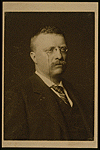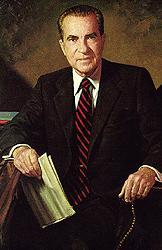Posted on May 16, 2003
Deep Throat's Progeny
Jayson Blair is only a symptom
by
Daniel Clark
... And now, for an exercise in journalistic ethics.
The president tipped back in his leather chair and gazed pensively in the direction of a crack in the far corner of the ceiling. "You know, Dan, it's like this," he said as he ran his thumb along the edge of the lucky arrowhead he keeps in his left pocket. "It is not the critic who counts, not the man who points out how the strong man stumbled, or where the doer of deeds could have done better. The credit belongs to the man who is actually in the arena."

... Well, all right. I wasn't actually there, so the president didn't really address me directly. I just thought that by personalizing the account, I would make it appear more real to my readers. Also, I took the liberty of fabricating a few details to make the scene more whole. I would guess that the president probably has sat in a leather chair and looked at a crack in the ceiling in some room, in some building, in some country, but I don't know for sure. He probably doesn't carry a lucky arrowhead, and even if I'd been there, I would have had no way of knowing what he had in his pocket. I just thought a colorful detail like that would help develop him as a character. ... Oh, and another thing -- you probably recognized the quote I attributed as part of a speech made by Teddy Roosevelt. That's okay, because "the president" in this story is a composite character, made up of all the presidents in American history, so to say that "the president" said it is really true, in a manner of speaking.
This may all sound ridiculous, and it should. But nationally published journalists have been practicing this kind of "reporting" with disturbing and seemingly increasing frequency.
New York Times reporter Jayson Blair recently resigned after a controversy erupted over his plagiarism, fabrication of quotes, and falsification of datelines, the last of which offenses he supported with phony expense reports. What's really shocking is that his transgressions of journalistic ethics are not news to the Times. These "inaccuracies" of his had become so troublesome that, over a year ago, Metro section editor Jonathan Landman reportedly warned others in an e-mail that, "We have to stop Jayson from writing for the Times. Right now." Landman's words were heeded ... briefly. After receiving a warning and being sent on a leave of absence, Blair returned, and was assigned to cover the Washington-area sniper attacks, during which he fabricated quotes from unnamed law enforcement sources.
This past March, Blair wrote a story about the family of rescued P.O.W. Jessica Lynch, in which he described Lynch's father as having "choked up as he stood on his porch here overlooking the tobacco fields and cattle pastures." Later reports pointed out that those things are not visible from the Lynches' porch. Moreover, the Times learned that the Lynches' house is located in a valley, not on the hilltop where Blair said it was. Apparently, Blair had never visited the family, and just assumed, since they live in West Virginia, that their house must be on top of a hill.
Blair's case is unusual because of how many warning signs the Times had seen of his behavior, but his methods of reporting are not unique. In November of 2001, Michael Finkel wrote an article for New York Times Magazine entitled, "Is Youssouf Male a Slave?" The story was about a teenage boy in the Ivory Coast who worked on a cocoa plantation for very little money. Unfortunately for Finkel, the Canadian branch of Save the Children was able to identify the picture of the boy which accompanied the article, and said that he was not the same boy written about in the story. Finkel then admitted that Youssouf Male was a composite character he'd created in order to raise awareness about child slavery.
If there have ever been any reported sightings of composite characters, they were probably riding pink elephants. Composite characters don't exist. What Finkel had written was a lie, but at the time he'd felt that the lie was justified. Janet Cooke of the Washington Post had the same feeling in 1980, when she wrote a Pulitzer Prize winning article about an 8 year-old heroin addict named Jimmy. After learning that Cooke had lied on her resume, the Post became suspicious of her writing, and asked her to prove Jimmy's existence. She didn't have time to create a Jimmy, so she was forced to admit that she'd made him up. The editors of the Post fired her, and returned her prize. Cooke's story was redundantly fictionalized in an episode of WKRP in Cincinnati, only with a happier, sappier ending.
Perhaps the most audacious journalistic fraud was perpetrated by Stephen Glass, who was fired as associate editor of the New Republic over a 1998 story he wrote about a teenage computer hacker named Ian Restil, who brought a software company called Jukt Micronics to its knees. Rather than having Ian arrested, the story went, the executives at Jukt offered him a job, so that they could use his shenanigans for their own evil purposes.

The story smelled like baloney to the editors of Forbes, who contacted New Republic editor Charles Lane to express their incredulity. Lane conducted an investigation, and found that Glass had fabricated not only the story, but everything in it, including Jukt Micronics, for which he'd gone through the trouble of posting a phony website. Ian Restil was also found to be nonexistent, as was a group called the National Assembly of Hackers, and a piece of legislation called the "Uniform Computer Security Act," which Glass claimed had been introduced in 21 states. A review of previous pieces written by Glass found that 27 of 41 articles contained similar fabrications.
The New Republic was far from the only publication to make the mistake of hiring Glass; he'd also written for Harper's, GQ, Rolling Stone, and the mercifully short-lived George. Did none of the editors of these publications check any facts?
This kind of fraud has not been limited to reporters, either. Shortly after Glass was exposed, Boston Globe columnist Patricia Smith was fired for buttressing her opinions with false quotes attributed to nonexistent people.
All of these writers were dismissed by their publications, but it would be foolish to believe that there aren't others getting away with similar acts of fraud on a daily basis. One would have to presume that poor journalistic ethics have existed for nearly as long as the written word, but they certainly seem to be gaining acceptance, and it's no wonder, ever since the profession has made cult heroes out of former Washington Post reporters Bob Woodward and Carl Bernstein.
Woodward and Bernstein's reporting on the Watergate scandal was based overwhelmingly on unnamed sources. Although a considerable amount of information they received from these sources turned out to be false, they seemed to be vindicated by President Nixon's guilt and resignation. The rest of the news media have primarily credited the two reporters with bringing Nixon down, as if they had played a greater role than the hearings in Congress. Despite their unorthodox methods, their reporting came to be seen within their profession as heroic.

To this day, Woodward and Bernstein insist that they had only a single source, the mysterious "Deep Throat" whose identity some have wasted the last thirty years investigating. For all the public knows, Deep Throat could be one person, as they claim, or he could be a composite character. He could even be a personification of documentary evidence, and/or a puppet through which the reporters could give voice to their own deductions and hunches. We don't know, and we aren't going to know as long as Woodward, who was supposedly Deep Throat's contact, keeps his promise not to reveal his source's true identity until that person is dead (and therefore unable to dispute his claim).
What do you suppose overly creative writers like Blair, Finkel, Cooke, Glass and Smith were taught about Woodward and Bernstein? Judging from most reporting today, journalism students certainly aren't deterred from mimicking them. It's far from unusual anymore to read front page stories in major newspapers that don't name a single source.
During the recent war in Iraq, the Bush administration came under a steady barrage of criticisms from "unnamed intelligence sources" and "unnamed Pentagon sources." Before the war started, similar sources were revealing secret attack plans, none of which was implemented. If any sources really existed for these stories, readers had no way of knowing whether they had any special authority or knowledge. An "unnamed intelligence source" could be the director of the CIA, or it could be a low level staffer, whose knowledge about the workings of the agency is derived from Tom Clancy novels. Early in the second term of the Clinton administration, an "unnamed Pentagon source" could have been Monica Lewinsky. Without identifying sources or corroborating their statements with hard evidence, attributing quotes to them relates virtually no information of value. When a reader skims an article, however, he is likely to take note of the word "Pentagon" and take the related quote to be an official statement. It's easy to see how this can be, and often is, manipulated.
If Jayson Blair can get away for years with lying about interviewing actual people he never met, how much easier is it to invent quotes from a source who can't be approached for verification? It can be proven that the Lynches' porch doesn't overlook a tobacco field, but nobody can prove that something was not said by a person whose identity is unknown.
Most of the journalists referenced here got themselves in trouble because their ambitions drove them toward exhibitionism. But what about a reporter whose mission is not personal recognition, but the advancement of a cause? He could sneak a lot of invented quotes from anonymous sources under the radar, especially if he's got a sympathetic editor. These sources could be every bit as phony as the corny kid from the Stephen Glass story who yells, "show me the money" across a conference table at software executives, but they'd be more subtle.
That's really why the print media are so alarmed by the Jayson Blair scandal. It's not that they're surprised that people are fabricating news stories; it's that Blair has inadvertently blown the whistle on their whole profession. When the Boston Globe caught Patricia Smith's fakery, it prompted them to scour their other columnists' work, leading to the firing of Mike Barnicle, for apparently lifting a few items in a bullet column from a book by George Carlin. In the wake of Blair's transgressions, media watchdog groups are going to start scrutinizing months and months of thinly sourced articles from major publications. Perhaps soon, the editors will wish they were anonymous also.
The Shinbone: The Frontier of the Free Press
Mailbag . Issue Index . Politimals